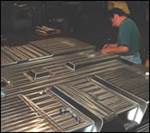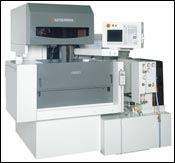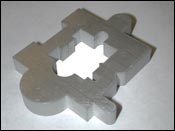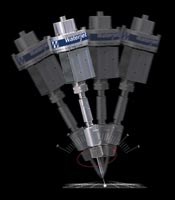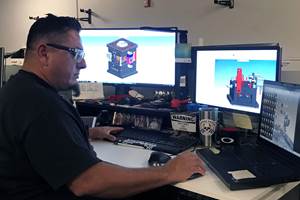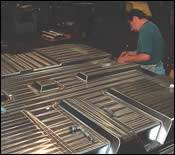Tech Tool & Mold, Inc.: Strength and Flexibility
This moldmaker garners the 2007 Leadtime Leader Award: Small Shop by being flexible with its customers, going lean, competing globally and uniting with other moldmakers.
Today’s business climate usually dictates a moldmaker find a niche and specialize in it, but Tech Tool & Mold, Inc. (Meadville, PA) has actually found strength in its ability to be flexible—providing production quality prototypes, hard milled prototypes, expandable and interchangeable tooling, stripper and floating cavity plate molds, hot runner molds, shuttle and insert molds, unscrewing molds, multiple slide action molds, face-mounted quick change tooling and production multi-cavity molds to their customers.
This flexibility has resulted in annual sales of $4,100,000 and an average sales growth of 23 percent over the past three years—quite impressive for this 30-employee operation. Occupying 7,440 square feet, the shop is full of highly skilled people and advanced technology to service markets that require highly complex, precision components in industries like automotive, medical, consumer electronics and aviation. Average leadtimes can be as early as two weeks, however Tech Tool President Scott Hanaway notes that due to the highly complex nature of the majority of the molds the company designs and builds, the average leadtime is between six and eight weeks.
“It is not our practice to try and merely maintain the leadtime,” Hanaway emphasizes. “In order for us to be competitive and continue to help our customers speed superior products to market, we have developed a complex synergy of advanced technology, training and precision machining techniques that optimize the deliverable requirements of specific products. We focus on manufacturing solutions beyond a due date that create long-term cost savings, maximize up-time and overall mold performance. Through continuous investment in new equipment and technologies we are able to increase coverage on unattended machines and improve all machine utilization rates. We are currently at 20 hours per day coverage on unattended machines. While machine utilization rates per machine vary, the work center inputs are tracked and monitored closely through digital enterprise resource systems designed for optimizing custom manufacturing processes and new equipment is purchased appropriately.
“Investment in new equipment and in employee training has not only increased productivity and efficiency, but has decreased our employee turnover rates,” Hanaway continues. “We boast a 5.59 percent turnover rate in our toolroom and the average toolroom employee has been with us for 11 years, with some as long as 27 years. We target each employee for a minimum of 40 hours of training per year.”
Tech Tool has an in-house engineering and design department that models lean methodologies through time compression of constraints, waste reduction and concurrent shaping of steel within the design cycle. According to Hanaway, this also creates a challenge for product design modifications where steel may have already been cut to accommodate design requirements before the customer can effectively modify their product detail. “With the speed and complexity of multi-dimensional manufacturing, anticipation of product specific changes is critical throughout the process and good communication becomes paramount,” he states. “A project manager is assigned to each product from conception through packaging—with the responsibility of increasing communication touch-points, anticipation of needs and the fulfillment product deliverables.”
Equipment Adds Value
Tech Tool has found that strategic investment in new technologies, researching cutting-edge mold design and build techniques and providing advanced training for their employees has not only increased the total delivered value of their molds but also has led to co-development of specialized CNC programming systems. The company’s CNC, EDM and high-speed machining centers are all palletized with off-line programming and set-up capabilities that are integrated with CMM inspection processes. The rapid flow of streaming CAM networks integrated with inspection technology engineers an extremely high level of quality into the mold build process. Mastering engineered quality at design has dramatically improved tolerance capabilities and the repeatability of time condensed manufacturing (see Equipment Sidebar).
The company looks beyond machine performance standards to boost competitive standing and works in conjunction with the equipment manufacturers. Tech and Charmilles have co-developed specially designed programming capabilities that deliver significant time reduction thresholds with greater quality and reduced total cost. Extensive programming times were the norm to create relatively simple paths. Advanced programming systems such as the one created with Charmilles offer speed and dynamic styles more in line with the computer-savvy technicians of today. More and more of the precision manufacturing workforce will start in the computer lab and then develop tooling knowledge rather than the other way around.
The same methodology used to create a dynamic tooling operation can be found in Tech’s molded plastics division. Investment in electric presses and the real-time networking of process parameters continues their quest for a value driven lean culture. Hanaway notes that these investments have helped to stabilize the molding environment, improve efficiency, and optimize data-based networking capabilities for proactive process control. “The influence of scientific molding, data-driven processes and advanced techniques has continually elevated the talent of our people. Automation, digital technology, training and advanced manufacturing synergies are the base ingredients for our strategic plan.”
Workforce Development
Tech Tool has embraced the industry’s ongoing challenge of finding and developing the necessary talent to handle today’s sophisticated manufacturing environment by partnering with local trade schools, universities, and associations through investments in time, resources and funding. “Our people hold positions on several boards and advisory positions with educational institutions, chambers of commerce, industry partnerships and community foundations,” Hanaway states. The company sets aside time to speak at local trade schools and universities, as well as students and parents alike to ensure that curriculum is available that builds skills young people need to enter into a high technology industry.
“Through serving on the board and in committee of the Northwestern PA Chapter of the National Tooling and Machining Association and the Metals Industry Partnership, we have raised the funds needed to market and campaign for education, industry awareness and recruitment,” Hanaway notes, adding that vocational schools, precision manufacturing institutions, higher education and technical education degrees have had significant increases in enrollment and boast exceptionally high placement rates due to industry promotion.
Hanaway himself is the President of the Northwestern Pennsylvania Chapter of the National Tooling and Machining Association, serves on the Board of Directors of the Manufacturer’s As-sociation of Northwest PA; and a number of Tech Tool’s employees serve on other organizational boards such as: the Vo-Tech Advisory Board and on the Board of Directors at Precision Manufacturing Institute (see MoldMaking Technology January 2007). “Our people also are active in the Meadville Area Chamber of Commerce, Gannon University’s Small Business Development Center Advisory Board, and Edinboro University’s Business and Economics Advisory Board, and are members of the Society of Plastics Engineers, and the American Society of Quality.”
Human Resource Manager Tracy Coon has served on PMI’s Board of Directors since 1998. “This involvement has helped me in my position to keep Tech Tool abreast of newly available technologies, training and grants that we would not have known about otherwise,” she states. “Participation on the PMI BOD also has allowed me to network with others in the industry as we planned the new multi-million dollar facility that celebrated its grand-opening back in May. While it does require a lot of time and extra work, I feel that my participation has helped not only the future of PMI, but Tech Tool and the entire manufacturing industry by ensuring quality education and a future vision for manufacturing.”
The company also partners with a number of local universities and technical schools to participate in apprenticeships, internships and ongoing continuing education for their workforce. The company offers training reimbursement and business training. “We believe that our people must be educated in order to make good, sound business decisions,” Hanaway points out. “Therefore, we provide finance, communications, strategic planning, goal setting, program management and lean process training.
For Dale Pringle, Tech Tool’s tooling division manager, serving on the Vo-Tech Advisory Board for Tooling has afforded the company many opportunities—including the ability to recruit quality apprentices from the school’s program. “I also have been able to increase communication with the instructors and provide them with inputs on curriculum and technologies that reflect the needs of today’s technologically advanced tooling industry,” Pringle comments. “This communication helps the school to keep up-to-date. Most recently, the Advisory Board has been involved with recertification of the school’s instructors according to NIMS standards.”
Tech Tool has a number of its plastics people enrolled in Plastics 101 and Processing, 13 of its off-shift toolroom employees completed Applied Communications in October, 16 people attended mold maintenance seminars (taught by Brian Young of Penn State Behrend in Erie, PA) and 13 staff mem-bers completed Project Management in August of 2006. [Editor’s note: At MoldMaking Expo 2007, register for Comparison of Conventional and Conformal Cooling in Conventional and Rapid Tooling, Jonathan Meckley, Penn State Erie, The Behrend College; Thursday, April 19th, 9:15 a.m.-10:00 a.m., Session 22. See the registration brochure on page 53 for more details and a registration form.]
The Move to Lean
In 2003, Tech Tool developed a strategy to implement lean concepts in a high-precision custom mold building environment. Tech found that the effectiveness of a lean approach to tooling is maximized by a tiered use of time, cost and waste removal principles, Hanaway notes. “Activities and metrics were defined to fit the work cell and its relationship to the flow of work based on processes,” he says. “The primary goal is speed-of-process to generate an invoice and increase inventory turns. The vision focused on the elements of time involved in the mold build process including the most basic activities that detract a toolmaker from maximizing productivity.
“Our studies indicated that true productive time was greatly diminished by three main factors: information exchange, process coordination and resource planning,” Hanaway continues. “Improving information exchange required detailed product flow planning and scheduling on the front end. The time that was allocated to a structured planning process allowed for toolmakers to initiate and engage the next step in each process—eliminating a ‘job bench’ where parts wait for a foreman to move it to the next stage. Process coordination and traceability improvements required an ERP system that greatly improved product visibility and financial controls. Resource planning required a common sense, no thrills system of locating shared tooling, initiating purchase requests and fulfilling supply needs.”
Hanaway adds that the application of lean methodology in a job environment can be very rewarding. “Tech Tool was able to reduce mold build cycles which include final invoicing by 10 to 30 percent through scheduling techniques, system tools and the simplification of supply needs,” he comments. “Basic systems that eliminate travel time and miscommunication—such as magnetic nameplates placed on the photo of a shared resource at the tool crib—lets others know what item is out and who has it. An entry level person is charged with line supply of standard operating materials at shift intervals to allow advanced journeymen machinists to focus on moving quality product to the point of invoice. The culture has changed from a batch system to a fluid and dynamic process of following the critical path of project management.”
Addressing Global Issues
Tech Tool has found a number of innovative ways to remain viable in a global marketplace. Hanaway points out that while the company’s location in a moldmaking hub could have been a “competitive nightmare,” Tech Tool turned the tables by uniting with other moldmakers. “We realized long ago that the small manufacturers have strength if we join together to bring more work to the region,” Hanaway states. “We helped form a 40-member consortium of highly specialized tooling and machining companies. The consortium is represented at industry-specific trade shows and markets the group under the name the SOURCE through multiple Web and direct mail channels. We have the ability to take on large scale projects that require multiple disciplines and/or services that a single company may not be able to adequately provide. It is not uncommon for members of the consortium to refer jobs to other members.”
Along those lines of customer satisfaction, Tech Tool takes it one step further by surveying its customers and using the responses to fine-tune its services. “The differentiator of precision molding services can be summed up best by our customers,” Hanaway notes. “Based on satisfaction survey responses, we provide an exceptionally high level of both initial and long-term quality, technical engineering assistance, and on-time delivery. Innovative solutions may encompass the use of technology. But, the creative application of ideas drives results. By design, our helpfulness of customer service is felt at all touch-points with customers. From the front desk to the loading dock, our people are committed to building much more than precision products. They build lasting satisfaction and relationships.”
Charting Growth
Clearly, Tech Tool has found a formula for success that will sustain the company in the future. The company’s mantra is the continual development of people, technology and innovative techniques to ensure long-term, value-driven services. “Our recipe for competitive strength is founded upon excellence training for core technological skills combined with creativity, innovation and project management,” Hanaway says. “The most advanced machining centers and equipment can be purchased and located practically any where in the world by any competitor. The strategy and objective that we feel defines the future of manufacturing lies in the talent to develop new processes like palletization, automation and cellular control of hard milling and electrode manufacturing; more advanced techniques including the development of software that combines multiple machining processes for lights-out concurrent manufacturing; and demand-driven services that are created from the confidence inspired through technical assistance, helpfulness of customer service and exceptionally high quality.”
Hanaway adds that the company will continue to rely on its current staff of experts to lead the next generation of incorporated precision tooling and molding disciplines that mold products faster, more efficiently and with added value.
Related Content
Steps for Determining Better Mold Prices
Improving your mold pricing requires a deeper understanding of your business.
Read MoreTackling a Mold Designer Shortage
Survey findings reveal a shortage of skilled mold designers and engineers in the moldmaking community, calling for intervention through educational programs and exploration of training alternatives while seeking input from those who have addressed the issue successfully.
Read MoreThink Safety: Eliminate Hazards Throughout the Shop
The tooling community is taking advantage of new products for safer mold shops and molding facilities.
Read MoreMold Design Review: The Complete Checklist
Gerardo (Jerry) Miranda III, former global tooling manager for Oakley sunglasses, reshares his complete mold design checklist, an essential part of the product time and cost-to-market process.
Read MoreRead Next
Chicago Mold Engineering: In The Spotlight
Focusing on a niche in the automotive headlap reflector market—coupled with the most advanced technologies and mold manufacturing techniques—lights the way for this moldmaker’s 2007 Leadtime Leader Award: Large Shop.
Read MoreHow to Use Strategic Planning Tools, Data to Manage the Human Side of Business
Q&A with Marion Wells, MMT EAB member and founder of Human Asset Management.
Read MoreAre You a Moldmaker Considering 3D Printing? Consider the 3D Printing Workshop at NPE2024
Presentations will cover 3D printing for mold tooling, material innovation, product development, bridge production and full-scale, high-volume additive manufacturing.
Read More
